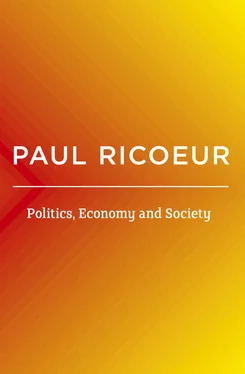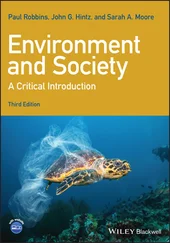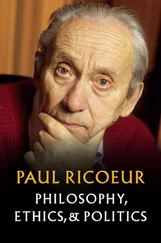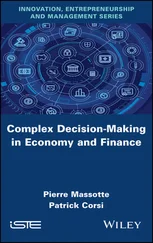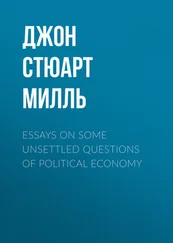All these threats are tendencies, as are the resources of reason, order, and justice that the State develops as the history of power unfolds. What makes the State a great enigma is that both tendencies are contemporaneous and together form the reality of power. The State is, in our midst, the unresolved contradiction of rationality and power.
Our Twofold Political Task
Before drawing some consequences for action on the basis of this double reading of political reality, is there a need to recall two essential rules?
First rule: it is not legitimate (nor even possible) to deduce a politics from a theology. For any political commitment is at the point of intersection of a religious or ethical conviction , of information of an essentially profane nature, of a situation that defines a limited number of available possibilities and means, and of a more or less risky option . It is not possible to eliminate from political action the tension arising out of the confrontation of these various factors. In particular, conviction which is not tempered by a reflection on the possible would lead to a demand for the impossible by demanding perfection: for if I am not perfect in everything, I am perfect in nothing. On the other hand, a logic of means, not tempered by a meditation on ends, would easily lead to cynicism. Purism and cynicism are the two extremes between which political action moves, wavering in its calculated culpability back and forth between the morality of all or nothing and the technique of realization.
Second rule: political engagement makes no sense for the Church but only for believers. This seems clear in principle, but it is not yet the case in fact: Churches are themselves cultural realities that weigh in the balance of power, and there still remains a more or less unacknowledged, residual, shameful politics of the Church. This is why the secularism of the State has not yet been realized: we are witnessing the death-throes of political and clerical Christianity, and this interminable agony is demoralizing for believers and unbelievers.
It is therefore in terms of the political responsibility of the Christian individual that we must now draw the conclusions of the preceding contradictory analysis.
If this analysis is correct, we have to say that we must at one and the same time improve the political institution in the sense of greater rationality and exercise vigilance against the abuse of power inherent in State power.
***
What sort of institutional improvements are we particularly responsible for today?
1. It seems to me that, first of all, we have to continue constitutional evolution in a reasonable direction, one that takes into account the appearance of new nations in the geographical area controlled by the French State. The number one problem of French politics is transforming the centralized State, inherited from the monarchy and from the Jacobin Republic, into a federal State, capable of bringing together on an egalitarian basis the nations that have emerged within its borders ; this invention of new structures would genuinely promote rationality, for it would consist in adapting constitutional reality to the historical, cultural, and human reality of the modern world. The alternative will be decisive: either we do this, and new ties will be made with peoples overseas, or else we do not do this, and these peoples will carve out their own destiny apart from us, even against us.
2. Next, we have to reinvigorate the life of political parties . We cannot say that the experience of multiple political parties is doomed, and that this pluralism simply reflects class divisions: we need a political instrument that will allow citizens to enter into discussion in order to shape and to formulate opinion. The existence of several parties would still be essential, even in a classless society, because it translates the fact that politics is not science, but opinion; there is only one science – and even this is not entirely true – but there are several opinions on questions concerning the direction of public policy. Thus, it is in the interest of democracy that the parties survive the death threats resulting from the weight of bureaucracy, the ossification of party machinery, the false reality of ideologies unrelated to the real problems of the day, and the absurd proliferation and pretentious dogmatism of French political parties. Doubtless, two parties would be sufficient, on condition that they integrate many contradictions, resolved in concrete forms of governance, and that internally they encourage ongoing and open discussion. This is the essential condition for reinvigorating public opinion.
3. We then have to invent new ways for citizens to participate in power other than the election system and parliamentary representation. Here we can learn from the efforts in Yugoslavia, Poland, and other examples of producing new forms of representation for groups of workers and consumers. If a labor-based economy is in view which makes work the dominant economic category, only a political system in which workers would be represented as workers could make this labor-economy a civilization of workers. The task of inventing new forms of representation is perhaps to be combined with the reinvigoration of political parties; it is not simply a matter of defending democracy but of expanding it.
4. Finally, we have to, as people say, reinforce the authority of the State , but in a different way than is often stated. This would not be the primary task if reinforcing the authority of the State is taken to mean increasing the indirect power of several pressure groups over a weak State which, moreover, has not changed its centralized structure and relies on artificial parties, lacking substance, and without internal democracy. And yet this is what is commonly called reinforcing the authority of the State. Now, if this expression has a meaning, it signifies that civil power has authority over military power, over the police and the administration, that the decision-making power belongs to the executive and not to technocrats, that the executive is answerable only to popular representation and not to pressure groups, be they beet farmers or oil magnates.
This action is reasonable action and presumes that the State can be reasonable, that it is reasonable to the extent that it is the State, and that it can become ever more so.
***
However, this reasonable task in view of a reasonable State does not exclude – but, quite the opposite, includes – a vigilance that never lets down its guard, directed against the ever-increasing threat of an unreasonable and violent State.
This vigilance takes several forms.
1. It is first of all a critical vigilance on the plane of reflection. Political philosophy from Plato and Aristotle to Marx has never ceased returning to the theme of political perversions or alienations. But this vigilance wavers when political evil is believed to come from somewhere other than the political sphere, from the conflicts of classes or groups, and that having a good economy is sufficient for having a good political system. Constant reflection on the evils proper to the political, on the passions of power, is the soul of all political vigilance directed against the “abuse of power.”
2. But this vigilance must also take the form of an appeal and an awakening . It is sometimes necessary to appeal to the State on the basis of its founding values . Every State rests on an implicit or tacit consent, on a “pact” that seals a set of common beliefs, common ends, a common good (this is the “good” Saint Paul was speaking of when he said that the magistrate exercises constraint “for your good”). The State can and must be judged on the basis of the values that justify it. Thus, citizens can never be exempt by the State from serving these ideals, and have the duty to condemn actions incompatible with these ideals (exactions, we have to call them); protests against torture flow from this source. At the limit of protest, there is the possibility of illegal actions which have the value of testimony with respect to the “good” upon which the State itself is founded. These acts, in appearance harmful, are in reality very positive; they reaffirm and firm up the ethical foundation of the nation and of the State.
Читать дальше
